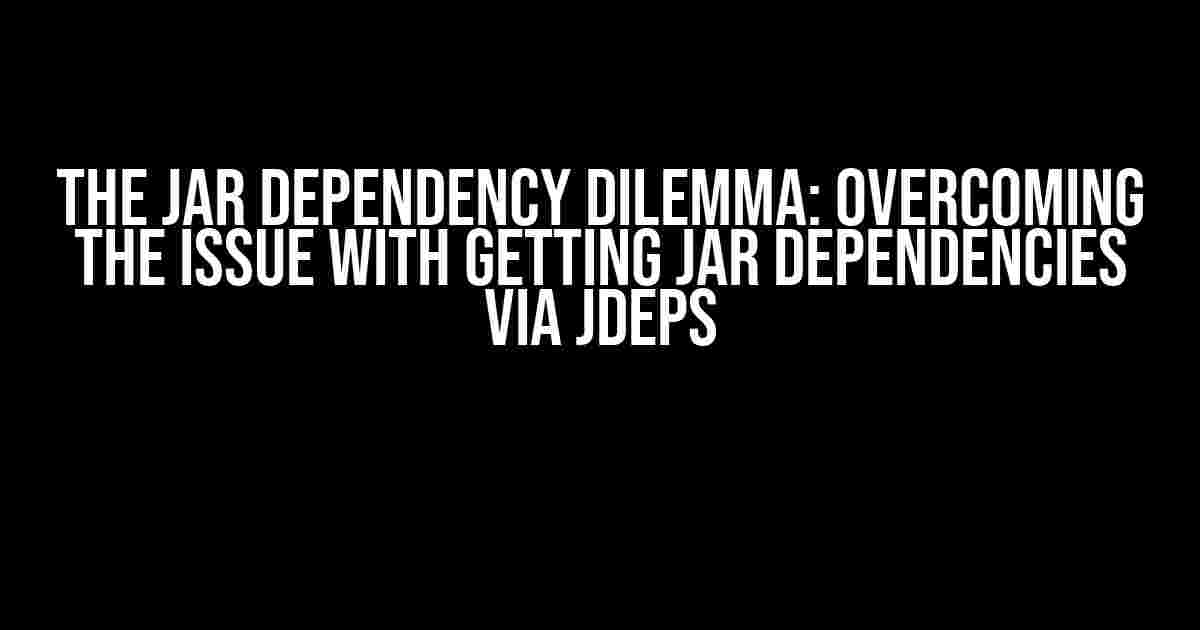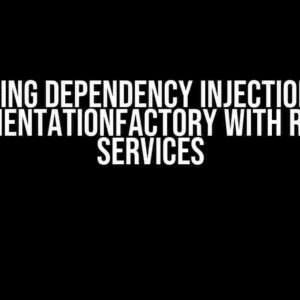Are you tired of struggling with jar dependencies while using Jdeps? Do you find yourself stuck in a loop of errors and frustrations? Well, fear not, dear developer, for we’ve got you covered. In this comprehensive guide, we’ll delve into the world of jar dependencies, explore the common issues that arise when using Jdeps, and provide you with clear, step-by-step instructions to overcome them.
What is Jdeps?
Jdeps, short for Java Dependency Analysis, is a command-line utility that comes bundled with the JDK. Its primary purpose is to analyze the dependencies of a Java application, providing insights into the jars, classes, and packages used by the application. However, as useful as Jdeps is, it’s not immune to issues, especially when it comes to resolving jar dependencies.
The Issue with Getting Jar Dependencies via Jdeps
One of the most common problems developers face when using Jdeps is resolving jar dependencies. This issue can manifest in various ways, such as:
- Unable to resolve dependencies for a specific jar file
- Jdeps failing to recognize or report dependencies
- Inaccurate or incomplete dependency reports
These issues can be attributed to a variety of factors, including:
- Incorrect jar file paths or naming conventions
- Version conflicts between dependent jars
- Incompatible or corrupted jar files
- Misconfigured Jdeps settings or options
Resolving Jar Dependencies with Jdeps: A Step-by-Step Guide
Now that we’ve identified the common issues, let’s move on to the fun part – resolving them! Follow these steps to overcome the hurdle of getting jar dependencies via Jdeps:
Step 1: Verify Jar File Paths and Naming Conventions
Make sure the jar files are located in the correct directory, and their names conform to the standard naming conventions (e.g., myjar-1.0.jar). Double-check for any typos or incorrect capitalization.
jdeps -cp /path/to/jarfile myjar-1.0.jarStep 2: Check for Version Conflicts
If you’re experiencing version conflicts, try using the `-verbose` option to get more detailed information about the dependencies:
jdeps -verbose -cp /path/to/jarfile myjar-1.0.jarThis will help you identify the conflicting versions and take necessary actions to resolve them.
Step 3: Inspect Jar File Integrity
Corrupted or incompatible jar files can cause Jdeps to fail. Verify the integrity of the jar files by checking their digital signatures or using tools like `jar` or `zip` to inspect their contents:
jar -tvf myjar-1.0.jarStep 4: Configure Jdeps Settings and Options
The default Jdeps settings might not be sufficient for your specific use case. Experiment with different options to customize the behavior of Jdeps:
jdeps -verbose -profile compact -cp /path/to/jarfile myjar-1.0.jarIn this example, we’ve added the `-profile compact` option to reduce the output size and make it more readable.
Step 5: Use Jdeps with the -J Option
When working with complex dependencies, using the `-J` option can help Jdeps to better understand the dependencies:
jdeps -J-Xmx1024m -cp /path/to/jarfile myjar-1.0.jarIn this example, we’ve increased the JVM heap size to 1024m using the `-J-Xmx` option, allowing Jdeps to handle larger dependencies.
Advanced Jdeps Techniques for Resolving Jar Dependencies
Now that we’ve covered the basics, let’s dive into some advanced techniques to help you resolve jar dependencies with Jdeps:
Using Jdeps with Maven or Gradle
When working with Maven or Gradle projects, you can use Jdeps in conjunction with these build tools to resolve dependencies:
mvn dependency:analyze -DskipTestsThis Maven command will analyze the project dependencies and provide insights into the jar file usage.
Creating a Custom Jdeps Profile
You can create a custom Jdeps profile to tailor the analysis to your specific needs. This involves creating a JSON file with the desired settings and options:
{
"profiles": [
{
"name": "myprofile",
"settings": {
"verbose": true,
"failOnMissing": true
}
}
]
}Save this file as `jdeps-profile.json` and run Jdeps with the `-profile` option:
jdeps -profile myprofile -cp /path/to/jarfile myjar-1.0.jarIntegrating Jdeps with CI/CD Pipelines
To automate the dependency analysis process, you can integrate Jdeps with your CI/CD pipelines using tools like Jenkins or Travis CI:
#!/bin/bash
jdeps -verbose -cp /path/to/jarfile myjar-1.0.jar
if [ $? -eq 0 ]; then
echo "Dependency analysis successful!"
else
echo "Dependency analysis failed!"
exit 1
fiThis script will run Jdeps with the `-verbose` option and check the exit status to determine the success or failure of the analysis.
Conclusion
Resolving jar dependencies with Jdeps can be a challenging task, but by following the steps and techniques outlined in this guide, you’ll be well-equipped to overcome the common issues. Remember to:
- Verify jar file paths and naming conventions
- Check for version conflicts and jar file integrity
- Configure Jdeps settings and options
- Use advanced techniques like Maven or Gradle integration, custom profiles, and CI/CD pipeline integration
With these strategies in your toolkit, you’ll be able to tackle even the most complex jar dependencies with confidence. Happy coding!
| Issue | Solution |
|---|---|
| Unable to resolve dependencies for a specific jar file | Verify jar file paths and naming conventions, check for version conflicts |
| Jdeps failing to recognize or report dependencies | Use the `-verbose` option, inspect jar file integrity, configure Jdeps settings and options |
| Inaccurate or incomplete dependency reports | Use advanced techniques like Maven or Gradle integration, custom profiles, and CI/CD pipeline integration |
By applying these solutions, you’ll be able to overcome the common issues associated with getting jar dependencies via Jdeps. Remember to stay patient, persistent, and creative in your troubleshooting efforts.
Additional Resources
For further learning and exploration, check out these resources:
- Oracle Documentation: jdeps
- Maven Dependency Plugin
- Gradle Dependency Management
- Jenkins Pipeline Steps
Stay tuned for more informative and engaging guides on various topics related to Java development and beyond!
Frequently Asked Question
Having trouble with Jar dependencies via Jdeps? Don’t worry, we’ve got you covered! Check out these frequently asked questions and get back to coding in no time!
Why is Jdeps not finding my Jar dependencies?
Make sure you’re running Jdeps from the correct directory where your Jar file is located. Also, double-check that you’ve included the correct classpath and module path arguments. If you’re still having trouble, try using the –system-jdk-exports option to help Jdeps find the dependencies.
How do I specify the classpath for Jdeps?
You can specify the classpath using the -classpath or -cp option followed by the path to your Jar file or directory. For example, jdeps -cp path/to/your/jar.jar. If you have multiple Jar files, separate them with a colon or semicolon, depending on your operating system.
What is the difference between -include and -recursive options in Jdeps?
The -include option specifies which dependencies to include in the analysis, while the -recursive option tells Jdeps to recursively analyze the transitive dependencies. Use -include to focus on specific dependencies, and -recursive to get a more comprehensive view of your dependency graph.
Why is Jdeps reporting missing dependencies that I know are present?
This might be due to version conflicts or dependency mismatches. Try checking the dependency versions and ensuring they match the required versions. Also, verify that you’re using the correct module path and that the dependencies are correctly exported.
Can I use Jdeps with Maven or Gradle projects?
Yes, you can! Jdeps can be integrated with Maven and Gradle projects to analyze dependencies. For Maven, use the jdeps plugin, and for Gradle, use the jdeps task. This allows you to leverage Jdeps’ power within your build pipeline.




